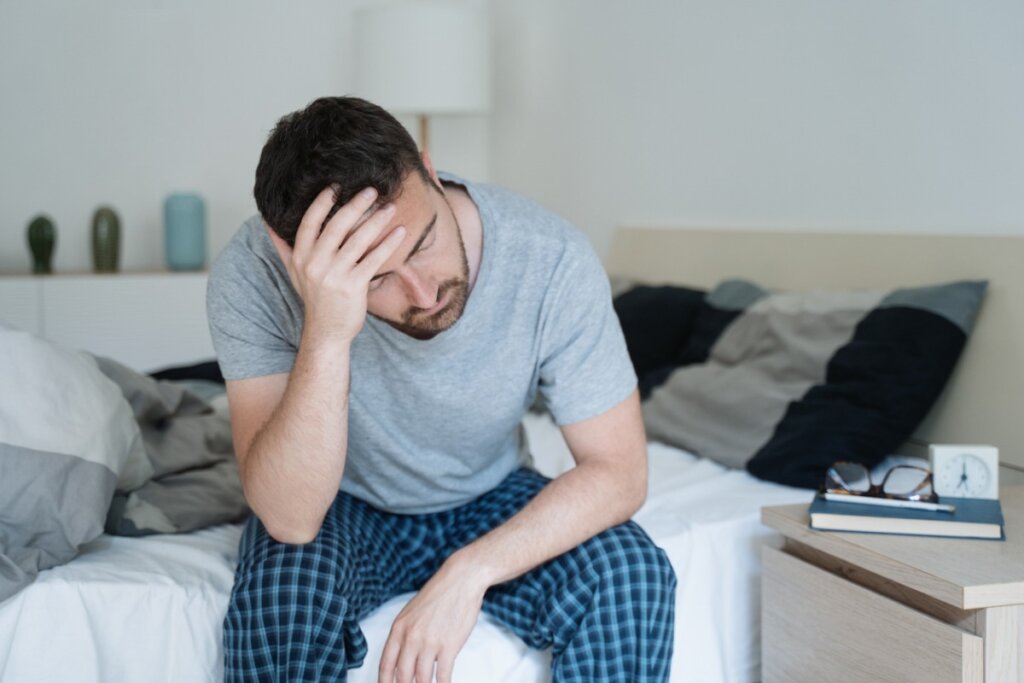Why Do You Feel Like You Can't Get Out of Bed in the Morning?


Written and verified by the psychologist Valeria Sabater
Every morning, as soon as you open your eyes, you think about how inspired you feel to get up and start the day. However, what if you don’t find any inspiration? What if it’s totally disappeared and you feel completely apathetic? In reality, we all have times when we don’t have the strength and motivation to start the day or to get dressed and go out into the world.
If you’re feeling low, you might find that not being able to get out of bed is a recurring experience. You don’t necessarily have to be suffering from depression. In fact, there are times when, for various reasons, you find it difficult to take off your pajamas and get going. Perhaps it’s a stressful job that’s switching off your desire to leave the refuge of your bed.
It’s not necessary to pathologize occasional stress or accumulated fatigue. You have the right to go through certain moments when everything weighs heavily on you, you don’t feel like doing anything, and feel as if you’d like to spend a whole week in the safety of your bedroom. After all, life isn’t easy, and it’s understandable to occasionally experience these sensations and perceptions.
The key, in all cases, is not to let them drag on over time. That’s because negative valence emotions that aren’t managed can become really disabling. However, understanding what’s happening to you will provide you with the tools to better face the situation.
Depression affects people in various ways, one of which is the need to spend more time in bed. Nevertheless, not all patients who feel this way are suffering from depression.

Why do you feel like you can’t get out of bed in the morning?
It’s one thing feeling lazy and simply not wanting to leave the comfort of your bed. It’s quite another to not be able to get out of it. In fact, not having the strength, courage, and ability to leave your bed and get dressed defines a far more complicated reality. It’s important to make this distinction because there are physical and mental health problems that might make it impossible for someone to start the day.
Maybe you’ve seen your life gradually change. You might have difficulty getting to work on time. You may even feel unable to take responsibility for the most basic of your household and day-to-day tasks. Added to this you probably feel guilty and uneasy for not being able to fulfill your obligations.
If you feel like you’re facing this kind of situation, you must take action. You mustn’t leave dealing with the kind of discomfort that’s so limiting to your quality of life until tomorrow. Let’s see what lies behind the experience of being unable to get out of bed.
Dysania defines the absolute inability to get out of bed. In these cases, it’s a characteristic of major depression
Sleep disorders: More than just sleeping poorly
Insomnia, sleep apnea, restless legs syndrome… There are many sleep disorders that can affect your difficulty in getting up. Extreme tiredness, constant waking up, or even working shifts and having to sleep during the day can make you feel this way.
The thyroid gland and alterations in your health
Any alteration in the thyroid gland will affect multiple areas of your well-being. You might think that a thyroid condition is merely associated with weight loss or gain, but there are many more symptoms. For example, hypothyroidism, the condition in which there’s a slowdown in metabolism, usually causes excessive sleepiness.
In situations of excessive fatigue and any other change in your health, you shouldn’t hesitate to visit your doctor. As a matter of fact, a study conducted by the Mayo Clinic claimed that thyroid disorders are directly related to sleep disorders.
Dysania, the reason for not being able to get up in the morning
Dysania is a clinical reality. It means not being able to get out of bed. It’s not that the sufferer is reluctant to get up or that they’re sleepier than usual. It’s a real physiological inability to get out of bed. Sometimes, sufferers, despite having managed to get up, get dressed, and leave the house, find themselves with the urgent need to go back to bed.
This condition isn’t an illness in itself, but rather the symptom of an underlying health problem. Dysania usually occurs alongside a major depressive disorder or chronic fatigue syndrome.
Associated psychological disorders: When your mood incapacitates you
When there’s no clear diagnosis that demonstrates the existence of a health problem, there might be another reason for being unable to get out of bed. It could be a psychological problem. In these cases, it’s essential to visit a specialist.
These are the clinical realities linked to dysania.
- Depression. As we mentioned earlier, a common symptom of depressive disorders is the need to spend more time in bed, alone, with the blinds down.
- Anxiety. As a rule, people dealing with anxiety often spend sleepless nights ruminating on their thoughts, ideas, memories, etc. This mental load of negative and distressing emotions makes it impossible for them to rest at night. Consequently, they’re unable to get up in the morning.
- Bipolar disorder. The ups and downs of going from the manic to the depressive phase can mean it’s really common not to be able to get out of bed at certain times.
- Seasonal affective disorders are another well-known cause associated with the inability to start the day. Indeed, the arrival of winter and the change in sunlight is a complicated time for countless people.
- Attention deficit hyperactivity disorder (ADHD) is associated with sleep disturbances.
In the above cases, it’s always recommended that doctors and psychologists are consulted.
In the event that you go for more than a week without being able to find the strength and courage to get out of bed, you should speak to your doctor.

What to do when you can’t get out of bed
If you’re depressed, you don’t feel like staying in bed because you lack goals and objectives. You want to stay there because everything you were holding on to is falling apart. However, when your spirits are on the floor, the last thing you need is a quick fix. That’s why, in this article, we’ve emphasized the need to always request specialized help.
Without a doubt, this is the first step to take. First, you need to understand what’s happening to you and let yourself be helped by experts. Then, you can put the following keys into practice:
Let natural light into your room
Light therapy is a really positive resource for improving mood. You simply need to allow the dawn sunlight to enter through your window to stimulate your brain and thus facilitate a peaceful awakening.
Start the day with small steps
Having to start the day in a rush saps both your mood and energy. For this reason, it’s worth setting your alarm clock a little earlier, allowing yourself to gradually and slowly get out of bed, and giving yourself plenty of time. Establish rituals that are rewarding: put on music, prepare a breakfast that you like, etc.
Take care of your routine
If your work and obligations allow, try to establish the same times for getting up and going to bed. Eating at the same time and turning off technology two hours before bedtime will also help.
Plan an inspiring experience every day
Meet a friend for coffee, buy a book, go to the countryside, go dancing or painting classes… We all have our own passions and special people with whom we love spending time. One way to improve your mood is to activate yourself behaviorally and make the effort to connect with your environment and with those hobbies that define you. Give it a try.
Finally, it’s quite common to feel like not getting up in the morning. Sometimes, it’s merely due to tiredness or simple work stress. However, you can take action to reduce the intensity of these sensations.
Every morning, as soon as you open your eyes, you think about how inspired you feel to get up and start the day. However, what if you don’t find any inspiration? What if it’s totally disappeared and you feel completely apathetic? In reality, we all have times when we don’t have the strength and motivation to start the day or to get dressed and go out into the world.
If you’re feeling low, you might find that not being able to get out of bed is a recurring experience. You don’t necessarily have to be suffering from depression. In fact, there are times when, for various reasons, you find it difficult to take off your pajamas and get going. Perhaps it’s a stressful job that’s switching off your desire to leave the refuge of your bed.
It’s not necessary to pathologize occasional stress or accumulated fatigue. You have the right to go through certain moments when everything weighs heavily on you, you don’t feel like doing anything, and feel as if you’d like to spend a whole week in the safety of your bedroom. After all, life isn’t easy, and it’s understandable to occasionally experience these sensations and perceptions.
The key, in all cases, is not to let them drag on over time. That’s because negative valence emotions that aren’t managed can become really disabling. However, understanding what’s happening to you will provide you with the tools to better face the situation.
Depression affects people in various ways, one of which is the need to spend more time in bed. Nevertheless, not all patients who feel this way are suffering from depression.

Why do you feel like you can’t get out of bed in the morning?
It’s one thing feeling lazy and simply not wanting to leave the comfort of your bed. It’s quite another to not be able to get out of it. In fact, not having the strength, courage, and ability to leave your bed and get dressed defines a far more complicated reality. It’s important to make this distinction because there are physical and mental health problems that might make it impossible for someone to start the day.
Maybe you’ve seen your life gradually change. You might have difficulty getting to work on time. You may even feel unable to take responsibility for the most basic of your household and day-to-day tasks. Added to this you probably feel guilty and uneasy for not being able to fulfill your obligations.
If you feel like you’re facing this kind of situation, you must take action. You mustn’t leave dealing with the kind of discomfort that’s so limiting to your quality of life until tomorrow. Let’s see what lies behind the experience of being unable to get out of bed.
Dysania defines the absolute inability to get out of bed. In these cases, it’s a characteristic of major depression
Sleep disorders: More than just sleeping poorly
Insomnia, sleep apnea, restless legs syndrome… There are many sleep disorders that can affect your difficulty in getting up. Extreme tiredness, constant waking up, or even working shifts and having to sleep during the day can make you feel this way.
The thyroid gland and alterations in your health
Any alteration in the thyroid gland will affect multiple areas of your well-being. You might think that a thyroid condition is merely associated with weight loss or gain, but there are many more symptoms. For example, hypothyroidism, the condition in which there’s a slowdown in metabolism, usually causes excessive sleepiness.
In situations of excessive fatigue and any other change in your health, you shouldn’t hesitate to visit your doctor. As a matter of fact, a study conducted by the Mayo Clinic claimed that thyroid disorders are directly related to sleep disorders.
Dysania, the reason for not being able to get up in the morning
Dysania is a clinical reality. It means not being able to get out of bed. It’s not that the sufferer is reluctant to get up or that they’re sleepier than usual. It’s a real physiological inability to get out of bed. Sometimes, sufferers, despite having managed to get up, get dressed, and leave the house, find themselves with the urgent need to go back to bed.
This condition isn’t an illness in itself, but rather the symptom of an underlying health problem. Dysania usually occurs alongside a major depressive disorder or chronic fatigue syndrome.
Associated psychological disorders: When your mood incapacitates you
When there’s no clear diagnosis that demonstrates the existence of a health problem, there might be another reason for being unable to get out of bed. It could be a psychological problem. In these cases, it’s essential to visit a specialist.
These are the clinical realities linked to dysania.
- Depression. As we mentioned earlier, a common symptom of depressive disorders is the need to spend more time in bed, alone, with the blinds down.
- Anxiety. As a rule, people dealing with anxiety often spend sleepless nights ruminating on their thoughts, ideas, memories, etc. This mental load of negative and distressing emotions makes it impossible for them to rest at night. Consequently, they’re unable to get up in the morning.
- Bipolar disorder. The ups and downs of going from the manic to the depressive phase can mean it’s really common not to be able to get out of bed at certain times.
- Seasonal affective disorders are another well-known cause associated with the inability to start the day. Indeed, the arrival of winter and the change in sunlight is a complicated time for countless people.
- Attention deficit hyperactivity disorder (ADHD) is associated with sleep disturbances.
In the above cases, it’s always recommended that doctors and psychologists are consulted.
In the event that you go for more than a week without being able to find the strength and courage to get out of bed, you should speak to your doctor.

What to do when you can’t get out of bed
If you’re depressed, you don’t feel like staying in bed because you lack goals and objectives. You want to stay there because everything you were holding on to is falling apart. However, when your spirits are on the floor, the last thing you need is a quick fix. That’s why, in this article, we’ve emphasized the need to always request specialized help.
Without a doubt, this is the first step to take. First, you need to understand what’s happening to you and let yourself be helped by experts. Then, you can put the following keys into practice:
Let natural light into your room
Light therapy is a really positive resource for improving mood. You simply need to allow the dawn sunlight to enter through your window to stimulate your brain and thus facilitate a peaceful awakening.
Start the day with small steps
Having to start the day in a rush saps both your mood and energy. For this reason, it’s worth setting your alarm clock a little earlier, allowing yourself to gradually and slowly get out of bed, and giving yourself plenty of time. Establish rituals that are rewarding: put on music, prepare a breakfast that you like, etc.
Take care of your routine
If your work and obligations allow, try to establish the same times for getting up and going to bed. Eating at the same time and turning off technology two hours before bedtime will also help.
Plan an inspiring experience every day
Meet a friend for coffee, buy a book, go to the countryside, go dancing or painting classes… We all have our own passions and special people with whom we love spending time. One way to improve your mood is to activate yourself behaviorally and make the effort to connect with your environment and with those hobbies that define you. Give it a try.
Finally, it’s quite common to feel like not getting up in the morning. Sometimes, it’s merely due to tiredness or simple work stress. However, you can take action to reduce the intensity of these sensations.
All cited sources were thoroughly reviewed by our team to ensure their quality, reliability, currency, and validity. The bibliography of this article was considered reliable and of academic or scientific accuracy.
- Baglioni C, Nanovska S, Regen W, et al. Sleep and mental disorders: A meta-analysis of polysomnographic research. Psychol Bull. 2016;142(9):969-990. doi:10.1037/bul0000053
- Gold AK, Sylvia LG. The role of sleep in bipolar disorder. Nat Sci Sleep. 2016 Jun 29;8:207-14. doi: 10.2147/NSS.S85754. PMID: 27418862; PMCID: PMC4935164.
- Léger D, Beck F, Richard JB, Sauvet F, Faraut B. The risks of sleeping “too much”. Survey of a National Representative Sample of 24671 adults (INPES health barometer). PLoS One. 2014 Sep 16;9(9):e106950. doi: 10.1371/journal.pone.0106950. PMID: 25226585; PMCID: PMC4165901.
This text is provided for informational purposes only and does not replace consultation with a professional. If in doubt, consult your specialist.







